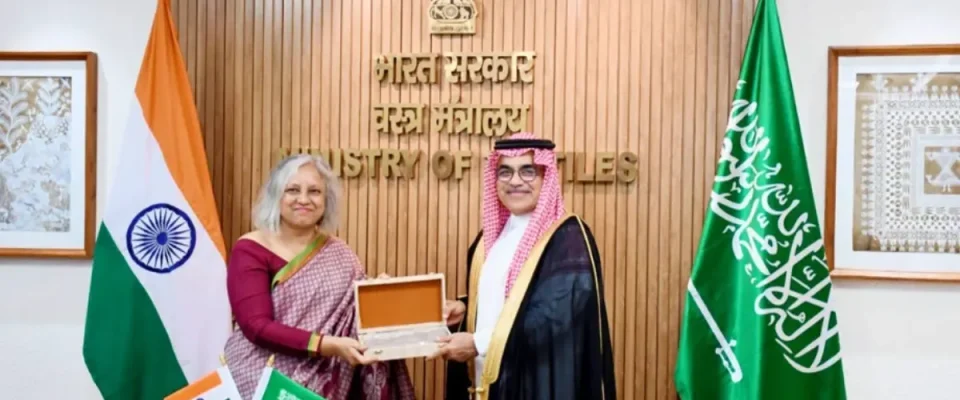A major highlight of the meeting was the discussion on Man-Made Fibre (MMF) and Technical Textiles, recognized as high-growth sectors in both economies.
In a significant step toward expanding bilateral trade and industrial collaboration, a high-level delegation from the Kingdom of Saudi Arabia, led by H.E. Khalil ibn Salamah, Vice Minister of Industry and Mineral Resources, met with the Secretary, Ministry of Textiles, Government of India, at Udyog Bhawan, New Delhi, today. The meeting marked a milestone in India–Saudi Arabia textile cooperation, focusing on investment opportunities, sustainability, and innovation in Man-Made Fibre (MMF) and Technical Textiles.
The dialogue underscored both nations’ shared ambition to enhance trade, strengthen manufacturing linkages, and foster mutual growth in the textile and apparel sectors, a core pillar of their long-standing economic partnership.
Expanding Bilateral Trade and Economic Ties
India and Saudi Arabia reaffirmed their commitment to building on an already robust economic foundation. Bilateral trade between the two countries reached USD 41.88 billion in FY 2024–25, reflecting steady growth and diversification across multiple sectors.
In the textile domain, India has emerged as a key supplier to the Saudi market, ranking as the second–largest exporter to the Kingdom’s textile and apparel sector with USD 517.5 million worth of exports. This accounts for an 11.2% share of Saudi Arabia’s total textile and apparel imports in 2024, solidifying India’s position as a preferred sourcing destination for high-quality, value-added textile products.
Both sides expressed strong determination to further expand this trade relationship through increased investment, technology transfer, and market access initiatives.
Saudi Investment Interest in India’s RMG Sector
A major focus of the meeting was to attract Saudi investments into India’s Ready-Made Garments (RMG) and apparel manufacturing segments—sectors that play a critical role in employment generation, particularly for women, and contribute significantly to India’s export earnings.
The Indian side showcased India’s competitiveness in textile production, skilled workforce, and the availability of world-class infrastructure through its newly established PM MITRA Parks. The Saudi delegation recognized the potential for joint ventures and co-development projects in these parks, which are designed to provide plug-and-play facilities for textile units, reduce logistics costs, and promote sustainable manufacturing practices.
The discussion also explored collaborative production models that integrate Saudi Arabia’s petrochemical-based raw material strength with India’s textile manufacturing and finishing expertise, paving the way for mutually beneficial value chain integration.
Focusing on Sustainability and Traditional Sectors
Beyond industrial-scale manufacturing, both delegations acknowledged the importance of preserving and promoting traditional and sustainable textile sectors such as handloom, handicrafts, and carpets. These industries are not only vital for preserving India’s artisanal and cultural heritage but also align with global consumer trends toward eco-friendly and ethically produced products.
The Indian side presented its initiatives for sustainable textile production, emphasizing organic cotton cultivation, natural dyes, circular fashion models, and traceable supply chains. The Saudi delegation appreciated these efforts and expressed interest in exploring collaborations in green manufacturing, skill development, and sustainable sourcing under the framework of Vision 2030, Saudi Arabia’s national transformation plan.
Strategic Synergy in MMF and Technical Textiles
A major highlight of the meeting was the discussion on Man-Made Fibre (MMF) and Technical Textiles, recognized as high-growth sectors in both economies.
The Indian Secretary of Textiles emphasized that India’s textile industry is rapidly diversifying from natural fibres to synthetic and technical segments, supported by the government’s Production Linked Incentive (PLI) Scheme and the PM MITRA Park initiative. These programs are designed to boost domestic manufacturing, innovation, and export competitiveness in advanced textile categories such as industrial fabrics, medical textiles, geotextiles, and protective clothing.
Saudi Arabia, with its strong petrochemical base, offers an ideal partner for India in raw material sourcing, especially for polyester, nylon, and other synthetic fibres. Both sides identified opportunities to establish joint ventures in MMF production, research partnerships, and technology-sharing arrangements to develop high-performance textile materials.
This synergy has the potential to make India–Saudi cooperation a key pillar of global MMF supply chains, catering to diverse markets across Asia, Europe, and Africa.
Trade Fairs, Market Access, and Business Collaboration
The discussions also underscored the importance of industry-led engagement platforms such as trade fairs, exhibitions, and buyer-seller meets. The Saudi delegation expressed appreciation for India’s flagship textile events such as BHARAT TEX, Reverse Buyer–Seller Meets (RBSMs), and India International Handicrafts and Handloom Fairs, which showcase the country’s complete textile value chain—from fibre to fashion.
It was noted that several leading Saudi textile firms participated in BHARAT TEX 2025, held in New Delhi in February 2025, engaging directly with Indian exporters and manufacturers. Similarly, a delegation of Indian textile and handicraft companies, led by the Export Promotion Council for Handicrafts (EPCH), participated in Saudi INDEX 2025 in Riyadh in September 2025, generating new business leads and joint venture proposals.
Both sides agreed to continue leveraging these platforms to promote innovation, investment, and knowledge exchange, with a focus on sustainable textiles, digital manufacturing, and global market connectivity.
Policy Support and Investment Facilitation
The Indian delegation presented two key government initiatives driving textile sector transformation:
- PM MITRA (Mega Integrated Textile Region and Apparel) Parks – Aimed at creating world-class integrated textile hubs with modern infrastructure, plug-and-play manufacturing facilities, and strong connectivity.
- Production Linked Incentive (PLI) Scheme for MMF and Technical Textiles – Designed to incentivize investment in high-value product categories and support India’s transition toward advanced manufacturing.
The Saudi delegation expressed keen interest in aligning these initiatives with Saudi Arabia’s Vision 2030 industrial diversification goals, exploring opportunities for joint investment, knowledge sharing, and institutional collaboration in textile value chains.
Deepening the Strategic Economic Partnership
The engagement reflects the strengthening of the strategic and economic partnership between India and the Kingdom of Saudi Arabia, two rapidly growing economies with complementary strengths.
The textile sector, which employs over 45 million people in India and contributes nearly 2.3% to the nation’s GDP, is a key driver of India’s export competitiveness. Meanwhile, Saudi Arabia’s emphasis on industrial diversification and non-oil exports under Vision 2030 presents new avenues for bilateral cooperation.
The meeting concluded with both sides reaffirming their intent to institutionalize regular dialogue, facilitate private sector participation, and develop an action plan to promote textile trade and investment.
Toward a Future-Ready Textile Partnership
The India–Saudi Arabia textile partnership is now entering a new phase of strategic engagement, built on shared priorities of innovation, sustainability, and inclusive growth.
With growing trade volumes, increased industrial collaboration, and complementary capabilities, both nations are poised to play a defining role in shaping global textile supply chains. The discussions at Udyog Bhawan signal a forward-looking approach—one that positions India and Saudi Arabia not just as trade partners, but as co-creators of a modern, sustainable, and resilient global textile economy.
News Courtesy : Devdiscourse



